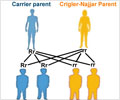A novel 30 minute DNA test to diagnose the development of certain inherited diseases in a person has been devised by Scottish scientists.
A novel 30 minute DNA test to diagnose the development of certain inherited diseases in a person has been devised by Scottish scientists.
The new technique developed at Edinburgh University will only require a drop of saliva to allow medics to identify variations in a patient's genetic code.Small changes in DNA can decide whether a person is healthy or prone to disease or has a life-threatening condition such as cystic fibrosis. The new test will be helpful in identifying which patients will benefit from certain drugs for diseases like cancer, and consequently in improving survival rates with more personalized treatments.
"The technology offers a speedy, cost-efficient alternative to existing methods of DNA analysis," the Scotsman quoted Dr Juan Diaz-Mochon, from Edinburgh University's school of chemistry, as saying.
He pointed out: "The market for DNA testing is quickly expanding as it becomes more affordable."
The new procedure uses a cocktail of chemicals to examine the genetic material, which is taken from a drop of saliva. Differences or omissions in the DNA code can then show if a person is healthy, vulnerable to disease or has a serious condition.
Dr Diaz-Mochon said: "What we have developed is a way of testing chemically.
"What we have done so far is prove the chemical method. Scientifically, it has been a great achievement."
The method could also be used to test for serious genetic conditions like Huntington's disease and cystic fibrosis.
Dr Diaz-Mochon said: "We could get the results in maybe half an hour from beginning to end. That is what we are aiming for."
The technique would initially be made available only to researchers, and might be used by health services later.
Dr Diaz-Mochon said: "There is still hard work to do, but the technology is very good and robust.
"We know what the technology can do, so it's a matter of getting quicker and making the whole process better."
Currently, the test can look for genetic variations for diseases only one at a time. But the scientists hope the technique could be used to decode the whole human genome, which would give information about genetic variations across the whole spectrum of disease.
Currently, this costs about 50,000 dollars and takes five days, but the new technique could see it done for less than 1,000dollars and in a few hours.
Prof Mark Bradley, who also worked on the project, said: "DNA sequencing is the next step on the pathway for this technology. That is much, much further away.
"We have proved the first part. We can do the single bases (of DNA]. Before we venture into the realm of DNA sequencing, we thought we'd consolidate on this particular offering initially."
The researchers are now planning to set up a company in the next six months to continue their work.
A spokeswoman for the Cystic Fibrosis Trust said: "Any new techniques which are cheaper and quicker would be welcomed and this research shows promise for other genetic conditions."
The procedure has been outlined in the journal Angewandte Chemie.
Source-ANI
TRI
 MEDINDIA
MEDINDIA




 Email
Email










